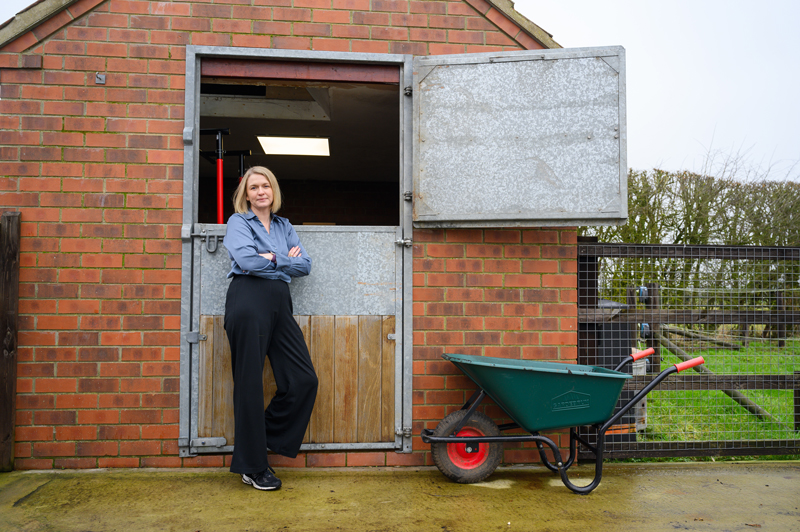Emma Hollis lives a life of two very different halves.
When we meet, she has just travelled to London from rural Lincolnshire where she and her husband recently moved to fulfil their dream of setting up a smallholding. Their plans for their six-acre plot include chickens, pigs, cows, a pond, woodland and a kitchen garden.
Hollis documents their journey on social media, regaling followers with stories about the bucolic challenges of such an endeavour, like a field mouse who eats their mail and marauding rabbits who destroyed their new fruit trees.
But that side of her life feels worlds away from her day job, running the National Association of School-Based Teacher Trainers.
For that work, she still spends much of her time in London, engaging with the government and trying to ensure her members’ views inform policy decisions.
So naturally when we meet it’s at the tiny Prêt just yards from the Department for Education.

‘Most challenging professional period’
Hollis dives straight in, describing a turbulent five years for teacher trainers.
“It’s been the most challenging professional period of my life,” she says. “The most rewarding, in some ways. Also the most heartbreaking.”
The sector had only just started to rally after “the horror” of the pandemic when, in 2021, the government unleashed its devastating initial teacher training (ITT) market review.
We lost about a third of our membership. It was very painful, very bruising.
The review was “effectively a redundancy process for the entire sector” as providers were forced to re-apply for accreditation.
The lengthy written application “assess[ed] your ability to complete a form in the right way, use the right words”. But “we don’t believe that it was a good proxy for finding quality,” says Hollis.
“We know of providers who, weeks before, had got ‘outstanding’ Ofsted judgments that didn’t get accreditation.”
She recalls one particular conversation with a teacher trainer who missed out.

“She said to me, ‘my husband’s in end-of-life care, and I resent every single second I spent on this instead of being with him’,” recalls Hollis.
“We lost about a third of our membership. It was very painful, very bruising. We’ve lost fantastic people from the sector.”
‘Teacher trainers are exhausted’
Years of changing policy have left the sector “exhausted”, but providers must remain “positive, upbeat, enthusiastic about the profession”.
“We’re the ones who are trying to attract people into the profession and trying to convince them that they’ve made the right choice and that this is the best job in the world,” says Hollis.
The sector has “kept showing up”, training teachers and being positive, “no matter how broken they were”.
“I think in some ways that’s our Achilles heel,” says Hollis. “I think government does trade on that. They just rely on the fact that nobody’s going to leave those kids in that classroom without somebody to educate and care for them.”
Solving the recruitment crisis
Hollis doesn’t mince her words about the teacher recruitment crisis.
“The position is dire,” she says. Although the previous government “did care deeply” about tackling the crisis, she hopes the new one will take a fresh approach.
“We can’t keep pulling the same levers,” she warns.
In order to “move the needle” on recruitment, Hollis says we must remove the financial obstacles to becoming a teacher.
We should be saying, as a society, ‘nobody should be taking on debt to train to be a teacher’
Those on tuition fee routes face costs of up to £9,535 “for the privilege of training to be a teacher.
“They’ve already taken on three years’ worth of debt from their undergraduate degree.
“Then we are saying to them ‘if you want to be a teacher in our state schools, you’ve then got to take on another £9,000-plus… and by the way, you’re not going to earn during that year either, with the exception of a few subjects that we will throw some bursary money at’.”
Hollis believes this suggests teaching “isn’t that important to us as a society, because society is not willing to pay for it”.
It also pushes people towards more lucrative jobs where they can start earning straightaway.
“We should be saying, as a society, ‘nobody should be taking on debt to train to be a teacher’,” she says. “I would also argue that if you make it a funded programme, you could even raise the bar for entry slightly higher.”
Whether the Treasury would sign off on such a costly idea is another matter, “but you never know,” says Hollis.
Graduate debt ‘terrifying’
Finances almost prevented Hollis herself from becoming a teacher.
Raised in Pinner, north London, until she was 10, Hollis’s family moved to Spain when a recession led to her stepfather losing his business.

The mortgage company took their London home, but they were “privileged” to have a holiday house they could move into.
“It must have been very distressing for my mum and stepdad,” says Hollis. “But I thought it was marvellous. There was the swimming pool down the road and it was very sunny, and I had a wonderful time.”
Hollis sat her GCSEs at an international school in Spain before returning to the UK to live with her father. She left home at 17, finishing her A-levels at Aylesbury High School while living with her boyfriend and friends.

She began studying at the University of Birmingham, but without financial support quickly racked up more than £13,000 of debt, which left her “terrified”.
Switching to the Open University, she completed her child psychology degree with first-class honours while working various jobs.
‘I never thought I could afford to train as a teacher’
Teaching “had always been at the back of my mind, but I never thought I could afford it,” says Hollis.
But while pregnant with her daughter, she saw an advert in the paper for the Graduate Teacher Programme – a new pathway that would allow her to earn while training.
“I never would have been a teacher otherwise,” she says. “There’s no way I could have done what tuition fee-paying teachers have to do now. I just couldn’t have afforded it. We had a mortgage, we had a baby on the way.”

Hollis initially became a full-time primary school teacher before moving to a part-time role at Two Mile Ash primary school in Milton Keynes, where she had trained, so she could spend more time with her daughter.
She later took over the department that ran initial teacher training, joined NASBTT’s management team in January 2016 and took over as executive director the following year, then CEO in 2024.
Today’s teachers face greater challenges
Hollis reflects on her own time as a new teacher, facing “30 little people, who all have their own stuff going on in their lives, and trying to make them learn maths when they don’t want to”.
“It’s a hard thing to do, but there was joy in it,” she recalls.
In contrast, today’s teachers are grappling with greater challenges than ever.
“Trainees are having to deal with more extreme forms of behaviour… with the mental health crisis, with poverty, with children with suicidal tendencies,” says Hollis.
“AI, social media, bullying… all of the massive issues we know are there in schools.”
More preparation needed for SEND support
Hollis was involved in developing the ITT core content framework (CCF), and she calls it “a fine piece of work”.
“[But] it only focuses on teaching standards, and they only really focus on educating children with curriculum stuff.”
She says providers frequently approach her, asking how they can “better prepare” their trainees for the realities of today’s classrooms.

“[They say] ‘we’ve only got nine months. We still need to do all of this CCF. [Trainees] still need to be able to teach whatever they’re trained to teach. But I feel like I’m under-preparing them.”
Meanwhile the government’s plan to increase SEND inclusion in mainstream will mean teachers need to be better-educated in dealing with more complex needs, placing further strain on the already-bulging training period.
“How can my members train somebody in nine months to be ready to do that?” she asks. “It is just impossible.”
The new initial teacher training and early career framework (ITTECF) aims to place more of a focus on SEND and mental health. But Hollis still feels nine months “is just too short a period of time” to do this.
“We’re just heaping on more and more, and the ITT providers at the bottom of all this are saying, ‘but what could we take out?’”
Primary teachers, she points out, must already be trained across 11 subjects. “Something’s got to give.”
Schools should be ‘staffed differently’
To turn things around, Hollis thinks we should “staff schools differently”.
“We’ve got to decide what we want schools to be, and then we have to staff them accordingly, and not just assume that a teacher who is coming to educate can do all the other stuff as well – without any training, without any support, without any supervision,” says Hollis.
But solving the issue isn’t easy, and won’t happen fast.
“We’re not going to get there in this Parliament,” says Hollis.
“That’s often what you’re fighting against… selling stuff to government. If you can’t show it’s going to be achieved within the Parliament, it’s almost impossible.”














Your thoughts